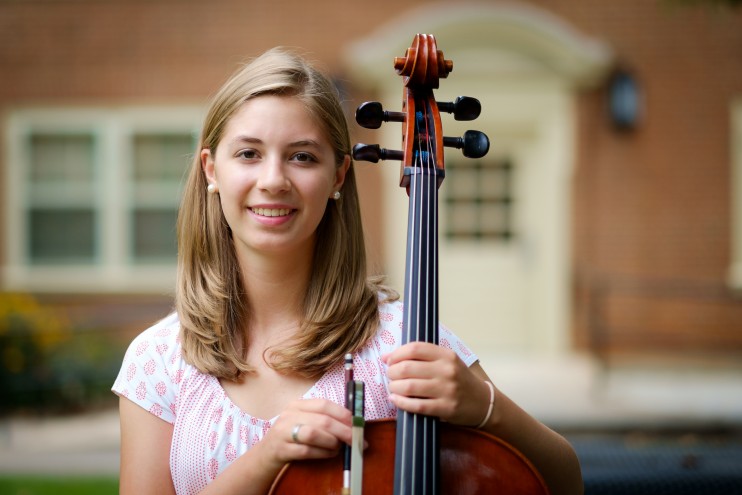
Elizabeth Sarkel is not your average Wake Forest sophomore. In addition to conducting an independent research project through the Biology department, Elizabeth is also a member of the Wake Forest University orchestra and an avid American Civil War history buff. She is also a Nancy Susan Reynolds Scholar. Made possible by the Z. Smith Reynolds Foundation, the Nancy Susan Reynolds Scholarship is awarded to up to six extraordinary students entering Wake Forest University. Scholars may also receive additional funds each summer for approved travel or study projects.
We recently sat down with Elizabeth to hear about her experience at Wake Forest as well as learn more about her post graduation plans.
Why did you choose Wake Forest University?
Wake was my first choice, and getting this scholarship actually allowed me to come here. I really liked the opportunities for undergraduate research and eventually want to go to graduate school for Biology. There are such great relationships between faculty and students, and I thought that could help me in the future. Wake also encourages you to try out things other than your major; for example, I’m a cellist. It’s a pretty small and close knit community of musicians at Wake. I know most people in the orchestra and we’re all pretty close.
Have you established a rapport with faculty through your Biology major?
Absolutely. I do independent research and my research mentor helps me plan my experiments, but doesn’t dictate - suggesting that I do this experiment or analyze that data. I’ve also learned a lot about how to communicate science based on your audience through this research experience. You don’t need to tell everyone each specific detail, even to people who are experts in the subject. Learning how to present my research at conferences has been one of the biggest benefits of doing independent research. I really like Biology and I like going into the lab and figuring out something new every day. It’s incredibly frustrating, but I love it!
Tell us more about your independent research.
I’m looking at how plant roots respond to gravity and how that alters their growth. Sometimes plants grow asymmetrically. They need to grow that way to get to water and nutrients. There’s a lot of signaling involved in that response. Charles Darwin discovered this trend and documented it, so we’re trying to figure out the molecular changes that allow that growth to happen. I had research experience in high school so I was able to plan my own experiment when I got here without having to work with a graduate student first. I thought gravity experiments with plants were cool and Wake hadn’t had anyone study this in five years, but had all of the necessary equipment.
The biggest application for this research is if we could get to Mars, we’ll have to learn how to grow plants. We have to grow plants to sustain life. So if there’s an altered gravity environment we need to know how plants will respond in order to get the best yield. There are important signaling molecules in all organisms.
Other than Biology, what other subjects have you enjoyed at Wake Forest?
I was an American Civil War reenactor with my great aunt and uncle, starting from when I was seven years old. I decided to take the class – Road to Civil War – because of my interest in history and experience as a Civil War reenactor. It was so amazing because I love history and to approach the subject from an academic perspective was really interesting.
Given all of your academic passions, what do you want to do after you graduate?
I want to get my masters and then my Ph.D. I want to be in academia for sure, but beyond that I don’t know. I would like to teach at a place like Wake Forest, where there’s a small school feel and you can have real interactions with students. In high school I had this plan to work in academia. Now that I’ve been at this school, it confirms I would want to work at a place similar to Wake.